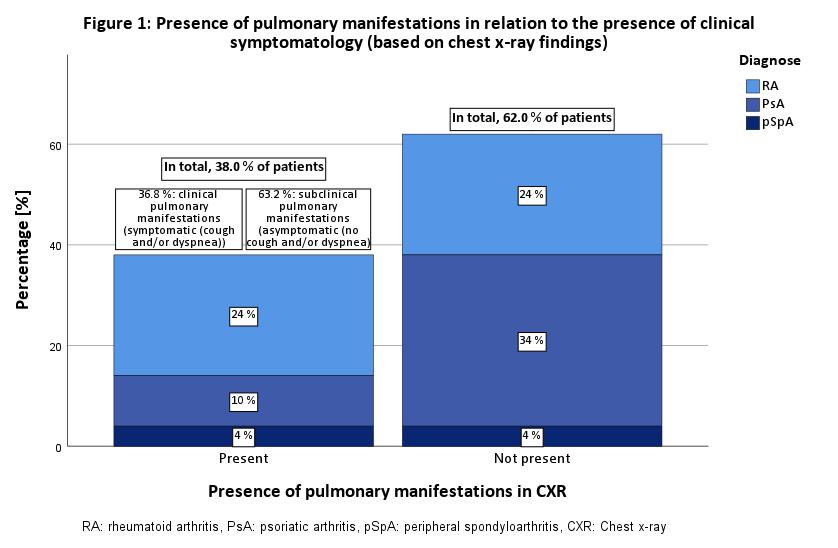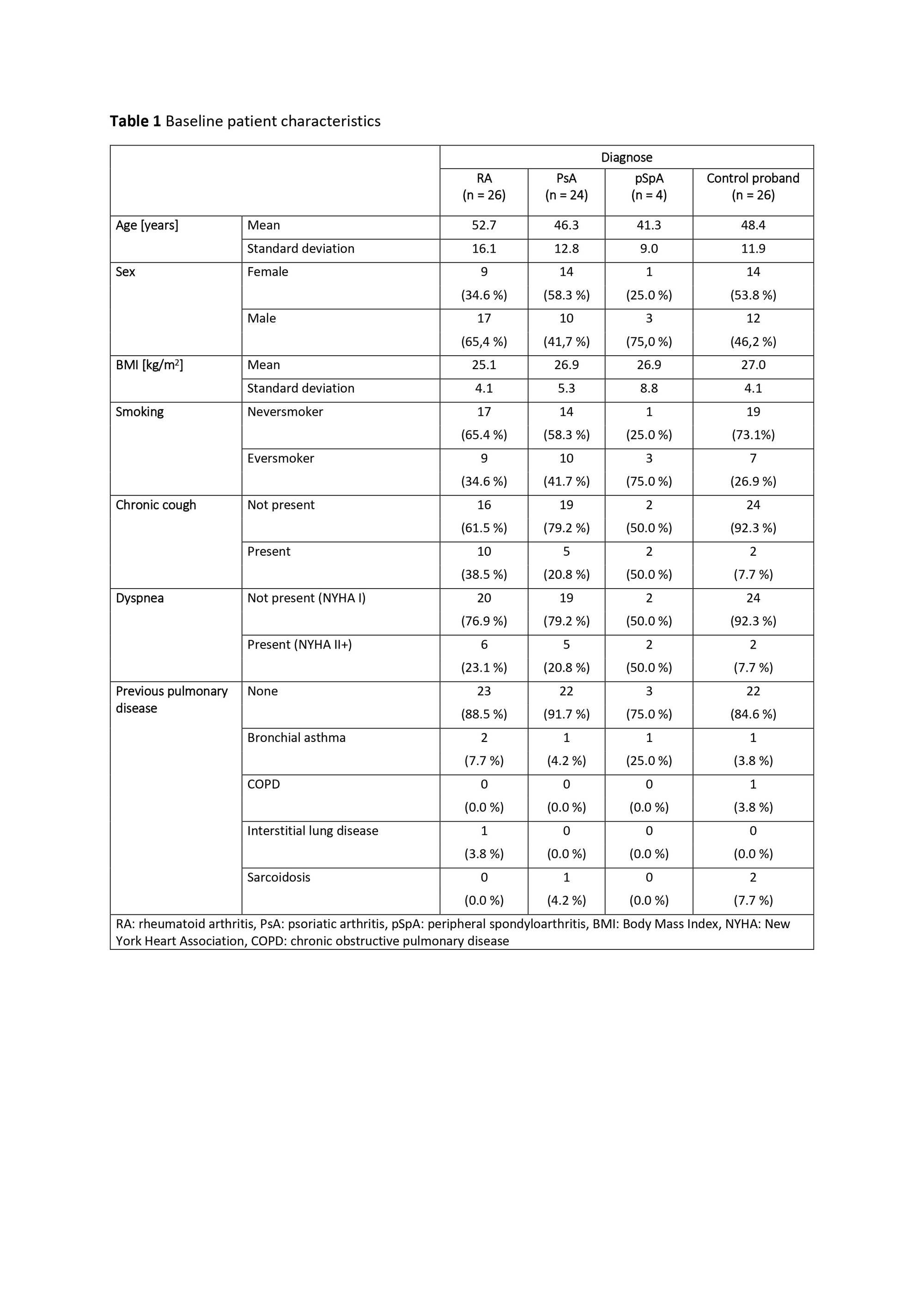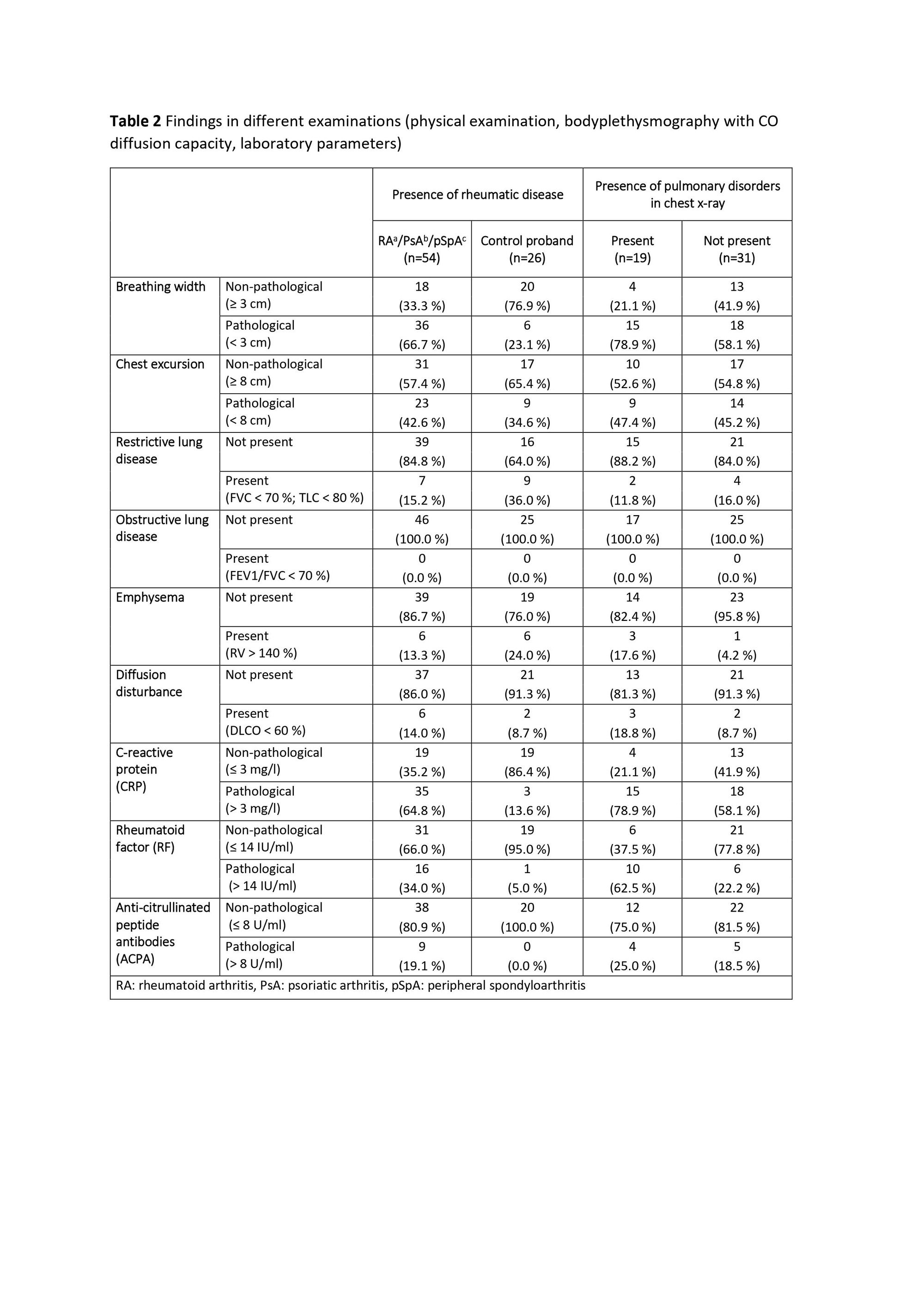Session Information
Date: Sunday, November 12, 2023
Title: (0380–0422) RA – Diagnosis, Manifestations, and Outcomes Poster I
Session Type: Poster Session A
Session Time: 9:00AM-11:00AM
Background/Purpose: Pulmonary impairment is a common, yet poorly understood, extraarticular manifestation in rheumatic diseases, which is often inadequately screened and managed. This can result in a substantial increase in morbidity and mortality [1]. While previous studies have mainly focused on rheumatoid arthritis (RA) and to some extent on psoriatic arthritis (PsA), data for patients with peripheral spondyloarthritis (pSpA) are lacking. The aim of this study was to investigate the prevalence of both clinical and subclinical pulmonary manifestations in newly diagnosed patients with RA, PsA, and pSpA. Furthermore, different baseline examination results were compared in order to develop a screening proposal for detecting patients at risk.
Methods: This clinical-prospective, longitudinal cohort study included a diagnostic workup consisting of a questionnaire for patient history, a physical examination, a body plethysmography with diffusion capacity for carbon monoxide (DLCO), a 6-minute walk test, laboratory parameters, and a chest x-ray (CXR) at the time of the initial diagnosis of arthritis disease, and at four additional time points in three-month intervals. This abstract thereby focuses on the baseline characteristics.
Results: In total 54 outpatients (26 RA, 24 PsA, 4 pSpA) and 26 age- and gender-matched controls were examined (tab. 1). Pulmonary impairment, in the sense of a morphologically abnormal CXR, was diagnosed in 19 arthritis patients (38.0 %). Of these, 36.8 % suffered from clinical symptoms such as cough and/or dyspnea. However, 63.2 % of the patients presented subclinical, asymptomatic pulmonary abnormalities (fig. 1). The baseline results of several examinations are illustrated in table 2. An elevation of rheumatoid factor ( > 14 IU/ml) showed an association with the manifestation of RA (p = .002) as well as with the presence of pulmonary affection (p = .008). In addition, the mean age of patients with pulmonary abnormalities (57.0 ± 12.8 yrs.) differed significantly from that of patients without such abnormalities (43.9 ± 14.3 yrs.), with a p-value of .002. The association between the activity of arthritis disease, assessed by Disease Activity Score in 28 joints using CRP (DAS28CRP), and CXR findings proved to be significant (p = .011). A DAS28CRP less than 3.2 (remission or low disease activity) indicated non-pathological findings in CXR.
Conclusion: The prevalence of pulmonary manifestations was more than one-third and more than two-thirds presented asymptomatic. The high proportion of asymptomatic patients highlights the need for the implementation of a pulmonary screening at the initial diagnosis of arthritis disease. By alerting physicians, especially in the observed age cohort of 57 years with elevated RF levels, morbidity and mortality could be reduced.
To cite this abstract in AMA style:
Winter L, Skowasch D, Weber M, Kütting D, Behning C, Brossart P, Petzinna S, Schäfer V. Prevalence of Pulmonary Manifestations in Patients with Newly Diagnosed Rheumatoid Arthritis, Psoriatic Arthritis, and Peripheral Spondyloarthritis [abstract]. Arthritis Rheumatol. 2023; 75 (suppl 9). https://acrabstracts.org/abstract/prevalence-of-pulmonary-manifestations-in-patients-with-newly-diagnosed-rheumatoid-arthritis-psoriatic-arthritis-and-peripheral-spondyloarthritis/. Accessed .« Back to ACR Convergence 2023
ACR Meeting Abstracts - https://acrabstracts.org/abstract/prevalence-of-pulmonary-manifestations-in-patients-with-newly-diagnosed-rheumatoid-arthritis-psoriatic-arthritis-and-peripheral-spondyloarthritis/



